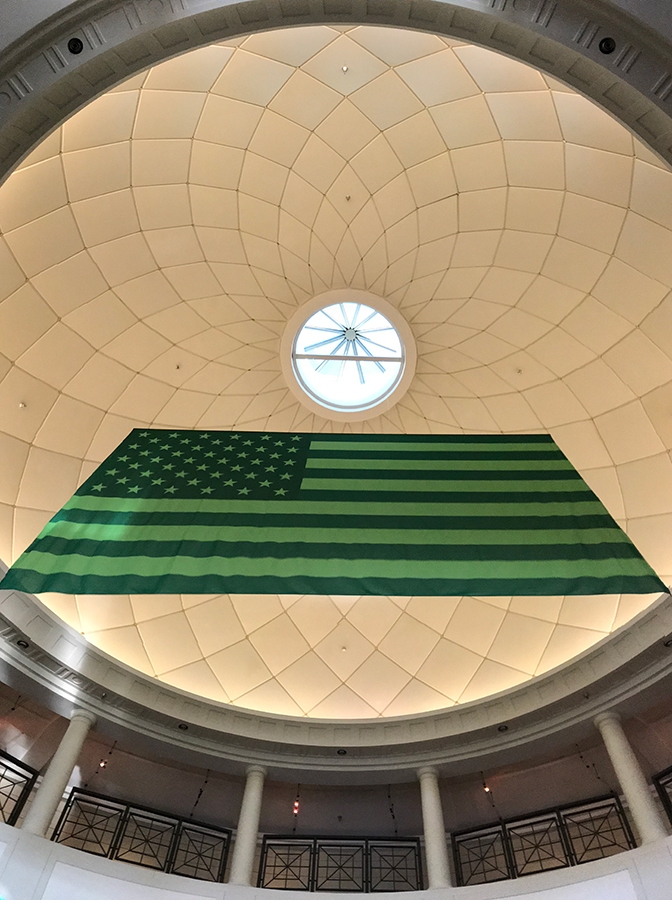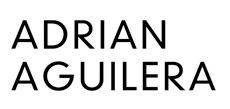© 2006 - 2024 Adrian Aguilera
Built with Indexhibit
From the Limitations of Now
From the Limitations of Now
Philbrook Museum of Art
Mach 14, 2021 - September 05, 2021
Adrian Aguilera and Betelhem Makonnen
untitled (a flag for John Lewis or a green screen placeholder for an America that is yet to be), 2020
Printed standard flag fabric
11' 8" × 20'
Philbrook Museum of Art will present From the Limitations of Now, a major museum-wide exhibition that explores how art can serve as a tool to re-examine our past, honoring those who challenge racial violence across America, and envision change in the country’s future. For the first time in Philbrook’s history, the exhibition will span the museum’s Helmerich and historic Villa galleries, juxtaposing contemporary art with objects in Philbrook’s permanent collection from the Renaissance to the 21st century.
The exhibition’s title and arguments are inspired by a speech that renowned Oklahoma author Ralph Ellison delivered in his home state in 1975. In it, he highlighted the power of art to help us more deeply understand America’s past and picture a future in which "we are able to free ourselves from the limitations of today.”
Many artists in the exhibition address grave injustices while intentionally refusing to reproduce explicit scenes of violence that are all too easily circulated for mass consumption. Instead, symbolic stand-ins are used to reference painful events in American history. Invested in amplifying stories that have been sidelined or suppressed, these artists argue for multidimensional representations of life and history. The exhibition argues that beauty, joy, and pleasure are critical in the fight against oppression.
The majority of artwork in the exhibition is new, including work by Adrian Aguilera, Serae Avance, Lex Brown, Black Moon, Crystal Z. Campbell, Dominic Chambers, Rahim Fortune, Lonnie Holley, Betelhem Makonnen, Troy Michie, Arcmanoro Niles, Joanne Petit-Frère, Kameelah Janan Rasheed, and Tyler Thrasher, produced in 2020 during the COVID-19 pandemic and uprisings across the country in response to the murders of George Floyd, Breonna Taylor, and countless Black lives.
In From the Limitations of Now, for the first time since 1972, Faith Ringgold’s iconic print United States of Attica (1972) — which honors those who organized the 1971 Attica Prison Uprising as well as those who fought for liberty and justice across the United States but were met with violence — will be restored to its original intention: to serve as an interactive map. Visitors will be invited to follow Ringgold’s instructions and update the map with historic events that are missing, noting all that has taken place since the work was first produced almost fifty years ago. 2021 marks significant anniversaries of two events listed on the map: the fiftieth anniversary of the 1971 Attica Prison Uprising, and the centennial of the 1921 Tulsa Race Massacre.
Hanging in the museum’s entrance will be a major new work by artists Adrian Aguilera and Betelhem Makonnen, untitled (a flag for John Lewis or a green screen placeholder for an America that is yet to be) (2020), in homage to legendary Civil Rights organizer and Georgia Congressman John Lewis, who passed away in July 2020. The work will be shown alongside his final essay to the country, written days before his death, in which he noted:
“Democracy is not a state. It is an act... Ordinary people with extraordinary vision can redeem the soul of America by getting in what I call good trouble, necessary trouble.”
Aguilera and Makonnen’s work honors Lewis, as well as the important work of so many others who have fought and will continue to fight for a more just world.
The exhibition brings artist Kahlil Joseph’s lush black-and-white 2016 video Wildcat (Aunt Janet), honoring one of Oklahoma’s last remaining all-Black towns — Grayson, Oklahoma — to screen in the state for the first time. Founded by Freedmen and Black Southerners long before Oklahoma’s statehood, all-Black towns played an important role in shaping many leaders in the state, including legendary Oklahoma educator and activist Clara Luper, who organized some of the first sit-ins in the country.
Through a year-long partnership with Tri-City Collective, a group of educators and writers committed to social justice, Philbrook will present an installation in the Villa’s original library around civil rights historian Quraysh Ali Lansana’s forthcoming book, Those Who Stayed: Life in 1921 Tulsa after the Massacre. Featuring new artwork by Skip Hill, the installation examines the powerful role that Black-owned newspapers in Oklahoma played in challenging injustices across the state.
The exhibition will also invite visitors to spend time with articles from The Black Wall Street Times about the historic figures and events referenced in the exhibition.
The exhibition is curated by Sara O’Keeffe, Nancy E. Meinig Associate Curator of Modern and Contemporary Art, developed in collaboration with exhibition partners The Black Wall Street Times, Fulton Street Books & Coffee, and Tri-City Collective.

